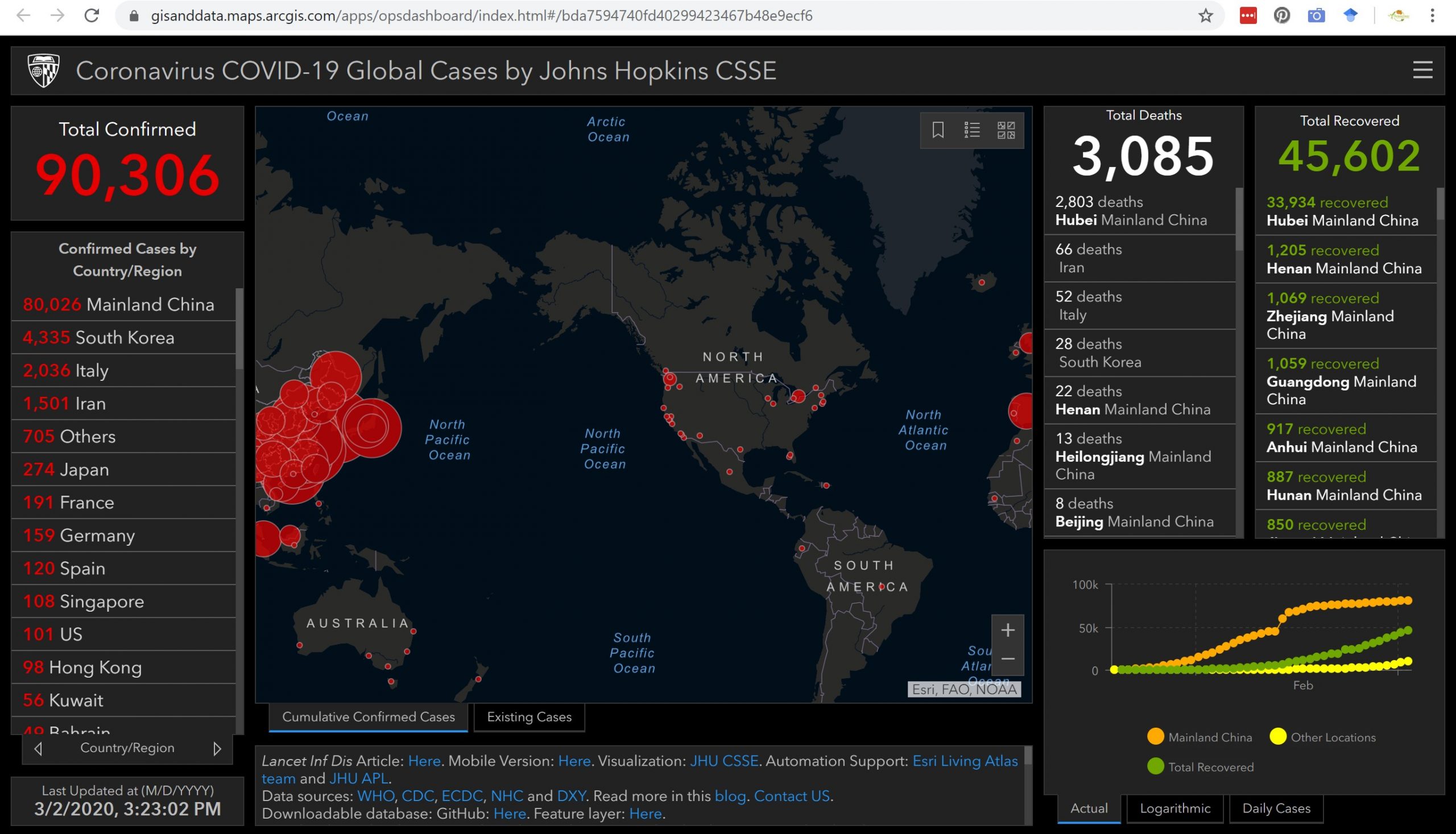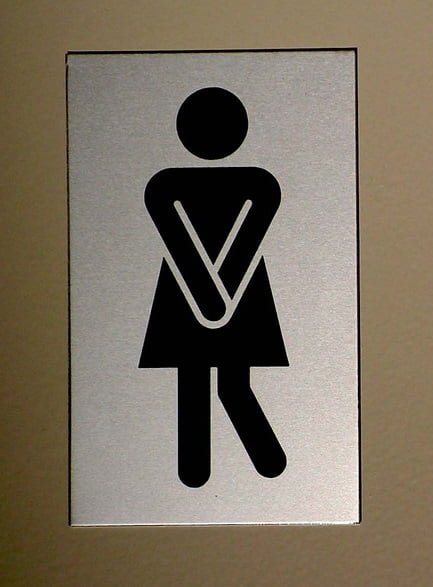Coronavirus and Keeping Healthy
I’ve been fielding calls from concerned friends, family, clients, blog post readers on what to do about the coronavirus outbreak. Some want to know how to make hand sanitizer since it’s sold out of all of the stores, some want to know how to boost their immune system, others are looking for advice on emergency preparedness in case they get quarantined at home. And then there’s a ton of general panic and hysteria on social media, mobbed stores, and face-mask-donned/nitrile-glove-sheathed people on light rail. I recently encountered frightened people boarding the plane with handkerchiefs tied over their faces like old Western bandits coming back from my PCRM Food for Life training program. So I thought it’d spend a little time about wellness with the Coronavirus.
What is Coronavirus (COVID-19)?
According to the CDC, the coronavirus is a family of viruses that includes the common cold, MERS (Middle East Respiratory Syndrome), and SARS (Severe Acute Respiratory Syndrome). This current variant is called Novel Coronavirus 2019 (COVID-19). This type of virus often affects animals but can transmit to humans, which has occurred in MERS, SARS, and now COVID-19. While this strain is new, the symptoms are like those in other coronavirus illnesses, which can be mild to moderate, based upon a person’s underlying health condition. It is very much akin to the common cold because it is a variant of it.
How it Spreads
The main way COVID-19 and other coronaviruses spread is through respiratory droplets from an infected, contagious person when they cough or sneeze. Researchers believe that people are most contagious when they are at their sickest. They are still investigating whether infected people without symptoms can spread the virus.
The virus may survive on surfaces, outside of the body, for some time, then picked up on the hands and transferred to the body through contact with the nose and mouth. The CDC is still testing to see how long the COVID-19 virus stays alive outside the body for this type of transmission.
Symptoms
Like the common cold, symptoms of COVID-19 infection include:
- Fever
- Cough
- Sneezing
- Shortness of breath
- Some have sore throat, muscle aches, headache, or diarrhea
These can develop approximately 2-14 days after exposure (the CDC bases this incubation period on research of previous coronaviruses). So, it presents much like the common cold or influenza.
Risk for Severe Illness
Risk factors are just like those of the common cold. Children are NOT at any higher risk for severe illness. Those at risk for more severe cases may include:
- Older people, >59 years of age,
- Those with decreased immune systems or chronic medical conditions, such as:
- Diabetes
- Cardiovascular disease, including high blood pressure
- Existing respiratory disease, like pneumonia
Why the Sudden Explosion in Cases?
When the outbreak was first reported to the US, officials from the CDC set specific guidelines for COVID-19 testing, which only included whether someone had recently traveled to China or been in contact with someone who had recently been to China. However, in the past few days, the guidelines were expanded to include people only with severe respiratory illness, regardless if they’d been in contact with a known or suspected COVID-19 patient. It’s now thought that the disease has been circulating around the US undetected for many weeks due to the initial limited guidelines.

You can see the current cases on a live map from Johns Hopkins CSSE
So the illness is not necessarily getting more prevalent, we’re just finding more of it because we’re testing more people for it!
Protecting Yourself & Others
Keeping yourself free of COVID-19 is as simple as what you already do to keep yourself from getting the common cold, the flu, or other viral illnesses.
- Wash Your Hands
- Keep Hands Off Your Face
- Practice Social Distancing
- Stay Healthy
- Stay Home if You’re Sick
- Cover Your Cough
Wash Your Hands
Handwashing is the top thing you can do to protect yourself from the coronavirus, and many other infectious vectors as well! And nothing beats good ol’ soap and water. The key is to scrub your hands together, clean under those fingernails, and do it long enough.
Back when I was taught handwashing at the medical school during my paramedic training, we were told to sing through Happy Birthday twice in our heads while washing our hands to ensure we were doing it long enough (20 seconds). This is still being taught today. It was a hoot this weekend listening to our 3-year-old granddaughter singing while washing her hands as she belted out the song through the bathroom door! It’s great for kids and adults, alike.
Tips for handwashing:
- Use whatever temperature water is comfortable for you. Hot, cold, warm, doesn’t matter.
- Use soap, bar or liquid, whatever you prefer. It doesn’t have to be antibiotic soap, in fact, it’s better for your immune system if it’s not!
- Scrub for at least 20 seconds.
- If there’s no soap available, rub your hands vigorously under the water as if you had soap and it’ll be just as effective! It’s the friction and rinsing that’s key.
- Dry off with a clean towel.
- You can use a towel to open the bathroom door afterward, but according to the CDC, research hasn’t shown that touching the bathroom door handle after washing your hands puts significant germs back onto your hands.
- Wash your hands after you sneeze, blow your nose, cough, touch your face, eat (beforehand too!), use the bathroom, touch potentially contaminated surfaces, etc.
Here’s a great video from the CDC about washing your hands:
Clean Hands Help Prevent the Flu
Clean hands can help prevent the spread of infectious diseases, such as flu. This podcast explains the proper way to wash your hands. Comments on this video are allowed in accordance with our comment policy: http://www.cdc.gov/SocialMedia/Tools/CommentPolicy.html This video can also be viewed at http://www2a.cdc.gov/podcasts/
I’ve had many people contact me about making hand sanitizer to avoid plastic containers. I haven’t made any and am not planning to as alcohol-based hand sanitizers are merely a temporary-use thing if you don’t have access to soap and water to wash your hands. The best thing is to wash your hands with soap and water. Even if you use hand sanitizer, you still need to wash with soap and water as soon as you can!
Hands Off Your Face
Touching your nose, mouth, eyes, or face is a prime way to get microbes like COVID-19 into your body. Help kids do the same, which I know is hard!
Practice Social Distancing
The closer in proximity you are to people, the more likely you are to have contact with microbes. Social distancing is merely keeping out of large groups, maintaining physical distance from others to avoid the transmission of disease. If there are a lot of COVID-19 cases in your area, perhaps eat at home rather than going out to dinner, etc. Limit your exposure.
Eat Well to Boost Your Immune System and Stay Healthy

Fruit, vegetables, whole grains, beans and herbs, high in antioxidants, complex carbohydrates, and vitamins are a great way to build your immune system!
The fuel you put into your body has a huge influence on your immune system function. Load up on colorful veggies, fruits, whole grains, beans, and keep yourself hydrated with plenty of fresh water. These plant-based foods are full of antioxidants from plant pigments, flavors, and vitamins to help fight disease. Fiber, only found in plant foods, feeds your gut bacteria, the major player in your immune system—there’s no fiber in animal foods, so pack in the plants to keep yourself healthy! And try to include some probiotic foods, like fermented foods, yogurt, tempeh, and miso, to boost the good bacteria in your body to combat invading pathogens.
Here’s a great podcast all about boosting your immune system with plant-based foods!
Stay Home if You’re Sick
I know it can be hard to stay home when you really want to go out, go to work, keep appointments, but staying home helps prevent the spread of illness and can help you get better faster. If you have a fever or still have symptoms, stay home, except to go to the doctor. Resting will help your body fight the infection, fluids will help prevent dehydration. If you do need to head to the doctor’s office, the CDC recommends:
- Call ahead so they are aware someone is coming with a respiratory illness. They may have an isolated waiting room for suspected coronavirus patients to help limit spread.
- Wear a face mask to prevent spread of droplets from talking, coughing, sneezing, etc.
- Wash your hands often so you don’t spread contaminants to other objects, people, or surfaces.
Cover Your Cough
Practice the Chicken Wing cough, also known as the Sleeve Sneeze or Elbow City technique. Cough or sneeze into your bent elbow rather than the palm of your hand. This blocks droplets from spreading and keeps them off your hands. Do follow up by washing your hands, though, afterward.
Clean Surfaces
Use a general household cleaner to wash surfaces, especially bathrooms, counters, desks, computers, workout equipment, etc. Computer keyboards and cell phones are often very contaminated, so spray some cleaner on a rag and wipe those down frequently too. Cloth rags are wonderful because you can launder them, cutting down on trash from paper towels. Much like hand washing, you don’t need antibacterial cleaners and general purpose cleaners will work just fine.
Trimazing! General Cleaning Spray
- 2 cups Water
- ¼ cup Rubbing Alcohol or Grain Alcohol (Everclear, etc.)
- 1 Tablespoon Castile Liquid Soap
Mix together into a spray bottle. Works on all surfaces, even stone. If desired, add about 10 drops of essential oil, like lavender, peppermint, or rosemary, and ¼ teaspoon of tea tree oil for a fresh scent and natural antibiotic properties. We use this throughout our house.
Don’t Panic!
First and foremost, don’t panic! In Seattle right now, people are crushing Costco and other stores in droves, panic-purchasing anything they think might be helpful, like toilet paper. It’s a mess and completely unnecessary. It’s a common cold virus. Go ahead and stock up on a few extras during your normal shopping, like tea, juices, fruits and veggies, hand soap if you don’t have extras already.
Unless you are a healthcare worker, don’t worry if you don’t have an N-95 face mask, or any face mask for that matter. Wearing a face mask is not going to guarantee you’re not going to get exposed to COVID-19. N-95 masks must be professionally fit-tested to ensure a proper seal to in order to be effective, so one from Home Depot may not do a thing for you anyway. If you are sick with a respiratory illness, do put on a face mask to stop the transmission of pathogens from droplets. This is the time to wear a mask, to protect others, and you can get one at your medical facility if you go seek medical attention.
Get Prepared for Future Emergencies
While things are confusing and quite stressful right now, this can really serve as a wake up call to get ourselves better prepared for future emergencies, disasters, and pandemics. Take stock of what you have and what you need and begin to build your emergency supplies. It may not be possible to do that right now with the buying frenzy at the moment, but when things calm down, build a 72-hour kit, get supplies in your car, get organized. If you need help, sign up for my free Be Your Own Hero Build a 72-Hour Kit program. It has information and shopping lists to get you prepared for next time.
Resources for More Information
There’s a lot of hysteria and misinformation out there. Here are some great sites to get current, relevent, and accurate information on COVID-19:
CDC https://www.cdc.gov/coronavirus/2019-ncov/index.html
King County, Washington https://www.kingcounty.gov/depts/health/communicable-diseases/disease-control/novel-coronavirus.aspx
World Health Organization https://www.who.int/emergencies/diseases/novel-coronavirus-2019
Red Cross https://www.who.int/emergencies/diseases/novel-coronavirus-2019
Do you like this post? Please share....
[mashshare]
If you liked this post, you might like one of these:
Categories:
Tags:

[Trī-māz-ing]
Cindy wants you to be Trimazing—three times better than amazing! After improving her health and fitness through plant-based nutrition, losing 60 pounds and becoming an adult-onset athlete, she retired from her 20-year firefighting career to help people just like you. She works with people and organizations so they can reach their health and wellness goals.
Cindy Thompson is a national board-certified Health and Wellness Coach, Lifestyle Medicine Coach, Master Vegan Lifestyle Coach and Educator, Fitness Nutrition Specialist, Behavior Change Specialist, and Fit2Thrive Firefighter Peer Fitness Trainer. She is a Food for Life Instructor with the Physicians Committee for Responsible Medicine, Rouxbe Plant-Based Professional, and Harvard Medical School Culinary Coach, teaching people how to prepare delicious, satisfying, and health-promoting meals.
She provides health and lifestyle coaching at Trimazing! Health & Lifestyle Coaching. Cindy can be reached at info@trimazing.com.
Subscribe to the Trimazing Blog
Receive occasional blog posts in your email inbox.
Subscribe to the Trimazing Blog
Receive occasional blog posts in your email inbox.




















